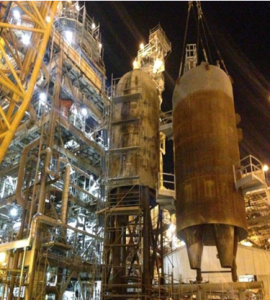Donald Leigh - HollyFrontier El Dorado
The Fluid Catalytic Cracking (FCC) process was developed during World War II to produce high octane aviation gasoline and butanes for synthetic rubber manufacture. The performance of the FCC unit, which forms the heart of most US refineries, plays an important role in determining refinery profitability. This is why the performance of the FCC is key to the overall refinery profitability. A key factor in determining FCC unit profitability in a refinery is the technology installed in the unit. Refineries utilizing the latest state of the art FCC technology are better able to maximize profits, especially in older units. Ever since the construction of the first FCC unit, active research and development has resulted in improved process technologies that have improved both reliability and yields resulting in an overall improvement in profitability of the refiner.

Old and New Reactor Heads on Jig Stands
HollyFrontier decided to revamp the FCC unit with the objective to improve the FCC profitability by upgrading to KBR’s latest state-of-the-art technology, while maintaining unit operability and reliability. In general, FCC units are typically revamped to either remove bottlenecks to increase the unit throughput/conversion and/or to incorporate technology upgrades to improve product selectivity. The FCC unit at El Dorado was not capacity constrained, however there was potential for improving product selectivity by upgrading the reaction side technology. HollyFrontier wanted to increase gasoline and Light Cycle Oil (LCO) from the FCC unit while staying within the alkylation unit capacity.
The upgrade included 1) the Riser Termination Device as it was expected to increase liquid product yields by 288 BPSD and 2) feed nozzle replacements to further increase the FCC liquid yield by another 222 BPSD above that of the Riser Termination Device.
 Don Leigh is Engineering Specialist with HollyFronter and has over 25 years of experience in refining. He has held roles of increasing responsibility in operations, process engineering, product blending, project engineering, and economics and planning. He graduated in Chemical Engineering from Virginia Tech and has an MBA from the University Of Pittsburg, Katz Graduate School Of Business.
Don Leigh is Engineering Specialist with HollyFronter and has over 25 years of experience in refining. He has held roles of increasing responsibility in operations, process engineering, product blending, project engineering, and economics and planning. He graduated in Chemical Engineering from Virginia Tech and has an MBA from the University Of Pittsburg, Katz Graduate School Of Business.







